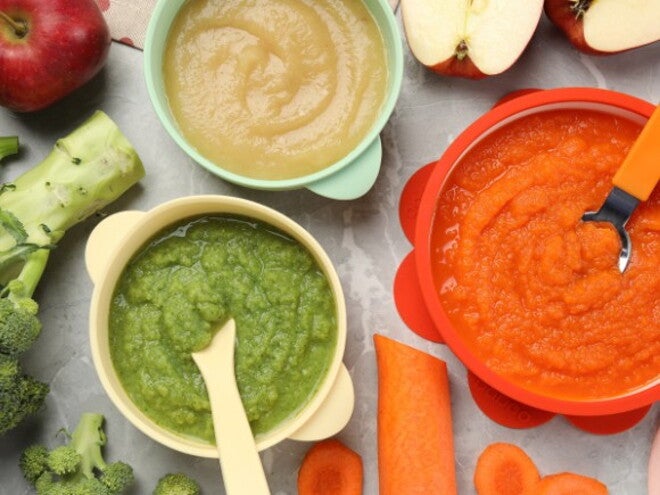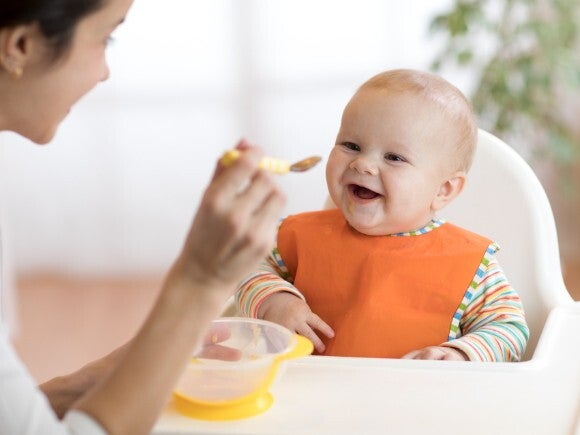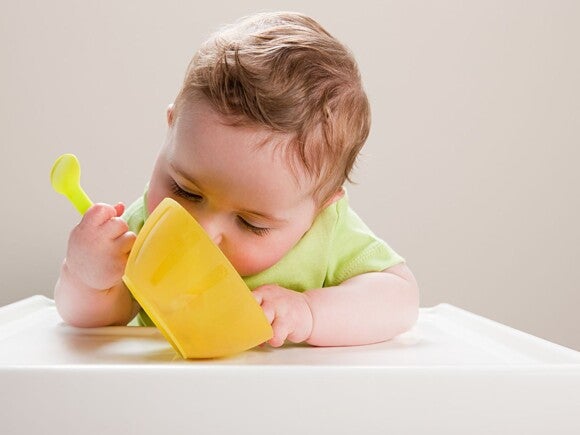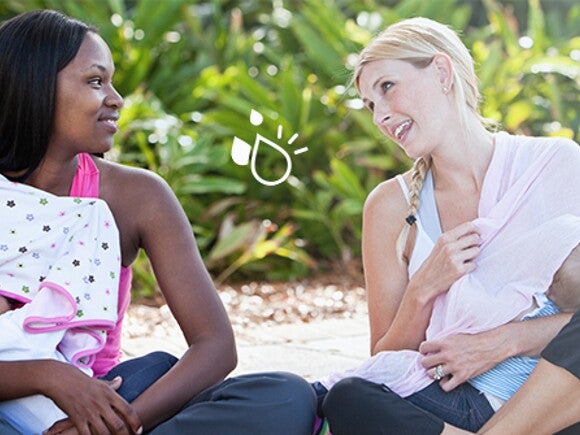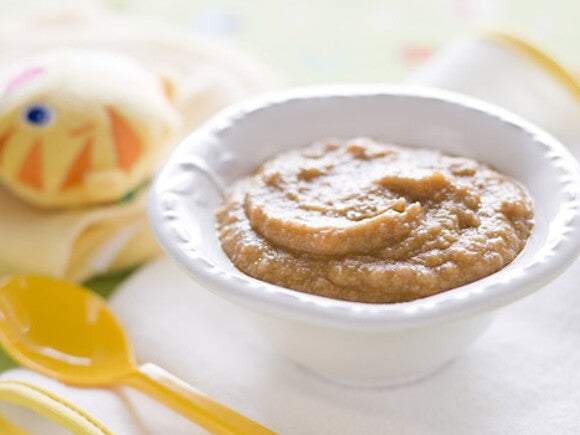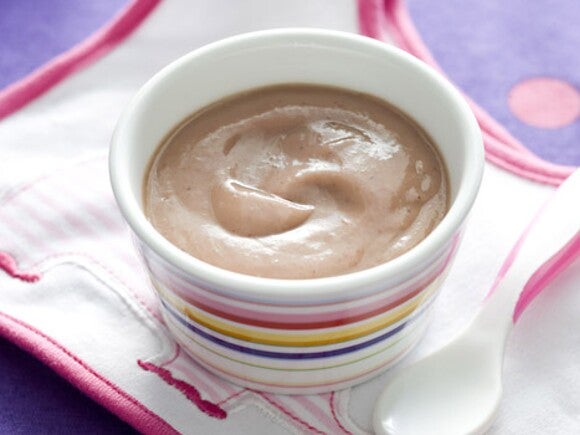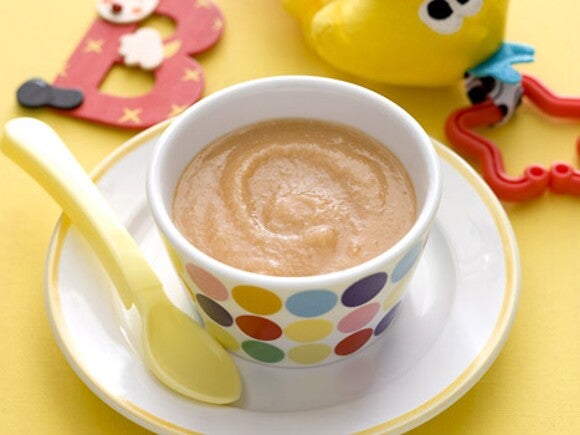At around six months, your little one will likely be ready for an exciting milestone: the first spoonful of solid food. While there are a couple of different ways to introduce your baby to solid foods, offering pureed iron-rich foods, fruits and vegetables on a soft spoon is the most widely recommended way, due to its suitable texture. Spoon-feeding helps your baby learn to swallow safely, exposes them to a variety of flavours and helps you keep tabs on how much they’ve eaten! Below we’ve answered some of the top questions around preparing and safely storing homemade baby food.
Pureed meat is a great source of Iron
- Cook meat, place in a bowl and allow to cool in the fridge for a bit. The meat you choose (e.g. any red meat, chicken or fish) will vary the cooking time.
- Cut the cooked meat into small cubes.
- Process the meat and the cooking juices using a blender until a smooth puree suitable for infants starting on solids.
Infant puree ideas - What fruits and vegetables should be cooked before being pureed?
Fruits – apples, apricots, dates, peaches, pears, plums, rhubarb (leaves completely removed), nectarines
Vegetables – beans, carrots, cauliflower, broccoli, peas, squash, potato, parsnip, sweet potato, turnip, pumpkin, spinach, zucchini, mushrooms
How to prepare infant purees for fruits and vegetables that require cooking
- Wash, peel (if necessary) and chop fruits or vegetables.
- Place in a small saucepan; pour over enough water to cover; bring to the boil, simmer until tender.
- Drain, reserving some of the cooking liquid. For younger babies, push fruit or vegetables through a sieve or blend in a blender until smooth, adding some of the reserved cooking liquid until the required consistency is reached. For older babies, simply mash with a fork, adding some of the reserved cooking liquid for a smoother consistency if required.
Note: Preparation and Cooking times will vary according to the fruit or vegetable being prepared and cooked
Infant puree ideas - What baby food doesn’t need to be cooked?
Fruits – avocados, bananas, melons, figs, mangos, pawpaw, strawberries, tomatoes, blueberries, raspberries
Follow the step-by-step instructions on how to prepare these raw fruits:
- Wash, peel (if necessary) and chop fruit, removing any seeds where needed.
- For younger babies, push fruits through a sieve or blend in a blender until smooth, adding some cooled boiled water, until the required consistency is reached. For older babies, simply mash with a fork, adding some cooled boiled water for a smoother consistency, if required.
- Not all uncooked fruits are suitable for freezing but can be refrigerated for up to 3 days.
FAQs
How to store puree?
Homemade infant food can either be fed to your baby straight away or stored in the freezer for later use. To store your infant puree, allow it to cool completely before transferring it to airtight containers or ice cube trays. Each cube is equal to about 1 tablespoonful, which is just right for babies starting out. Label and date the containers, then refrigerate or freeze for later use. Freezing left over puree means it can be stored longer than if storing in the fridge.
Can I make infant puree in advance?
Absolutely! As babies only eat small amounts in the first couple of months, it’s a great idea to make a small quantity of single serve purees which can be kept in the freezer and pulled out when required. Having a few different pureed foods on hand means you can mix and match different flavours and textures to see what your baby enjoys – and what they still may need more exposure to!
How do I re-heat frozen homemade baby food?
When it’s time to serve up your babies next meal, simply pop out your frozen puree cubes from the ice cube tray into a bowl or saucepan. Reheat in the saucepan on medium heat to defrost and warm the infant puree. Or place the bowl into the microwave to warm the puree, ensuring you stir it well before feeding it, to get rid of any hot spots. Before feeding to baby, always test the temperature using a clean spoon on your lip. When using a frozen puree, ensure any uneaten portion is discarded. It is not suitable for re-heating or re-freezing.
What puree should baby eat first?
At around 6 months of age when your baby is showing signs of readiness to start solids, introducing an infant puree that is rich in iron is the best starting point. Some common iron-rich first foods include iron-fortified baby cereal, or pureed meat, fish or chicken. When introducing purees to your baby, it is common to start with single-ingredient purees that are easy to digest and less likely to cause allergies. Apart from iron-rich purees, some other popular options include mashed or pureed fruits like bananas or avocados, or vegetables like sweet potatoes or carrots. Always supervise your baby when starting on pureed food.
How do you puree baby food without a blender?
If you don't have a blender, there are alternative methods to puree your baby’s food, including using a fork or potato masher; food mill or sieve, or mortar and pestle. You could also opt for easy-to-mash foods such as soft banana, avocado or stewed fruit, or choose foods that are already a pureed texture, such as iron-fortified baby cereal, or yoghurt.
Do you add water when you puree baby food?
Water can be added to your infant puree to help get the consistency just right for your baby. When babies are first starting on solid food, they may take a bit of time to get used to new textures as up until now they have only been used to liquid foods. Introducing solid foods that are too dry or too thick might be difficult, so adding water to dilute the consistency to suit your baby may be just what you need.
How to puree baby food?
The easiest way to puree baby food is to use an electric stick blender or food processor. Cook the desired meat, fruit, vegetable, or grain until soft, and then puree until smooth. Of course, if you don’t have an electric food processor, using a fork, potato masher, or mortar and pestle can work just as well for most soft, cooked foods. Add breast milk, infant formula, or water for desired consistency. Ensure the puree is smooth and appropriate for your baby's age and development.
Sources:
Eat for Health – Healthy Eating for infants, children and teenagers. Accessed at https://www.eatforhealth.gov.au/eating-well/healthy-eating-throughout-all-life/healthy-eating-infants-children-and-teenagers
